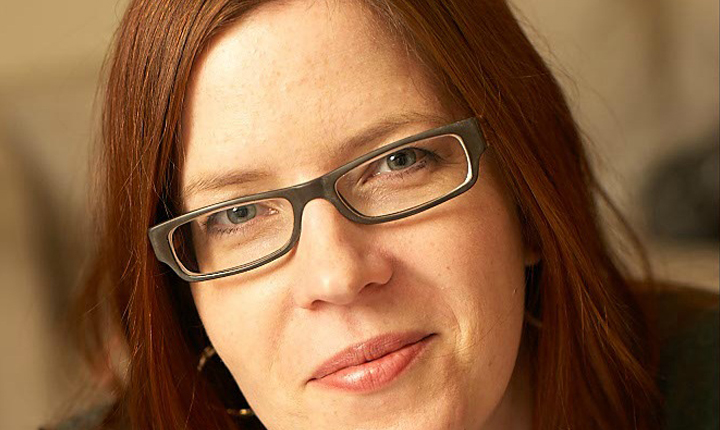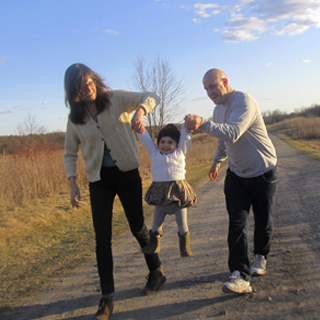The Longest Shortest Time
Etiquette for the Childless Friend
In this week’s episode, LST producer Joanna said her new year’s resolution was to be a more attentive friend to her friends who have children. Which reminded me of a couple I met recently at a party. Their names are Matt and Hillary, and that’s them up above. They’re in their mid-thirties and they don’t have kids, but most of their friends do. They told me that they really want to stay friends with their pals who’ve become parents—and they both love children—but it can be really hard to navigate new-parent etiquette. They started asking me a ton of questions about how to behave around their friends with kids. And rather than give them advice, I thought I’d pass their questions along to my favorite parental advice-giver, Magda Pecsenye. Magda writes the advice blog Ask Moxie, and it is great, people.
So check out her advice below. And keep in mind, these are purely etiquette questions for childless friends to parent friends; we are not addressing the added complication of, What if the childless friend is having fertility issues? That’s a whole other can of worms, which we hope to tackle with a different post. Also, Matt and Hillary had some advice of their own for parents who want to stay friends with their childless pals. We’ve posted that below Magda’s answers.

Magda Pecsenye
Q’s by Matt & Hillary; A’s by Magda
When new parents say they don’t want visitors, is there a point at which you should challenge them to share more time with friends?
Magda: This question is a little odd to me, like it’s the friend’s job to give the parents perspective or like the friends somehow have more rights than the child does, or like the baby needs to see the parents’ friends, or something. The parents just spent nine-ish months cooking the baby inside them and went through a really traumatic exit process, or did reams of paperwork and maybe a series of horrific flights or other stressors to get this kid. They have every right to cocoon with this child and just love them up and not have to share with anyone else. For weeks, or until they just need to see some other adults. Now, early parenthood is extremely stressful emotionally and physically, so if you think your new parent friends are being sucked under and can’t take care of themselves, you might want to step in and show up with food and do some loads of laundry and then leave. But there’s never any assumption that friends have a right to see the baby right away. And do you want to anyway? Teeny babies are boring and they kind of look like alien chickens. You’ll enjoy it more once the baby is older and more interactive.
In general, with kids, it will never be worse than it is today. Both in terms of the child being uninteresting or hard to keep up with, but also with the amount of time and emotion your new parent friend needs to give the baby. This is basically a situation in which your friend has fallen in love with someone new, and you know they’re going to be putting all their emotion and time into this person for awhile. If you get upset about it, you’ll lose them forever. If you understand that this is normal (and healthy, in terms of your friend’s process as a parent), your friend will circle back to you. Also, unlike falling in love with a new boyfriend or girlfriend, raising a baby is going to get better and better and the baby isn’t going to be jealous of you (or turn out to be bad for your friend), so you all win in the end.
It can be hard to think of what to say to new parents that won’t irk or offend them. What are some questions and comments that are generally welcome?
Magda: “S/he’s so beautiful!” “Wow, you don’t look like you just had a baby.” “Tell me the story behind the baby’s name.”
Avoid: comparisons to someone else’s baby, any mention of Gwyneth Paltrow, scary stories even if they work out fine in the end. Also avoid questions about the baby’s appearance–the birth process is ugly and babies look weird when they come out.
It can be a minefield, though. The hormone rush of new parenthood is a scary force of nature. I always advise people to only let people they feel a sense of ease with be around them in the first few weeks, even if those people know nothing about babies–better to have a 19-year-old boy who can order food and do laundry and make you laugh than your baby expert mother-in-law who makes you feel incompetent. So if you’re there with them in the first few weeks it means they trust you. (If your new parent friend gave birth, days 3 and 10 are seriously crazy hormone days, so anything said on those days doesn’t count.)
What’s the right way to ask to hold a baby? Should you not ask and only wait for an offer?
Magda: I’d just make it known. “I’d love to hold the baby, but I know you’ve been waiting so long that you might not want to give them up yet.” By the next visit they’ll be ready to let you hold the baby.
It’s also so OK if you don’t want to hold the baby. If you haven’t held babies before it can be scary and you can be concerned you’ll do something wrong. Or maybe you just don’t want to. I have this image that childfree people wear cashmere all the time just because they can, and maybe you don’t want spitup all over you. Babies spit up a lot, and it’s normal and developmentally appropriate. (Babies are essentially physical messes for the first three months, which is why some people call that the “fourth trimester.”)
Which gifts are most valuable to new parents? Which gifts are not so good?
Magda: My book is incredibly valuable to new parents, obvs. Any clothes you give them they will put the child in (see previous mention of spitup). Blankets. The Costco size container of laundry detergent (unscented).
Anything that’s not washable is not so good. Or anything that assumes parenting decisions, like a breast pump (unless they’ve registered for it or you’ve had a specific conversation about it).
Should friends of new parents offer babysitting or should they offer to spend time with parents while another person babysits? At what age is it even possible for friends to babysit?
Magda: This totally depends. Do you like hanging with babies? If so, offer to babysit. If not, help your friend with the babysitter situation (sometimes it can be hard to find trustworthy babysitters) and go out with your friend. If your friend is having a crisis and you refuse to babysit their kid when they really need you, that’s going to impact your friendship negatively, of course, but that’s more of an issue of being there for your friend through any kind of crisis than being specifically about the baby. If your friend’s car broke down you’d drive to get them even if you don’t know anything about fixing cars. It’s the same with babysitting in an emergency.
Also bear in mind that you might not like babies but you might love 4-year-olds. So you may not want to babysit now, but you might really want to be the person to take your friend’s preschooler to a birthday party at a play space. Kids need babysitters for a decade, so this isn’t your only chance.
If you’re just sitting there watching the baby sleep or pushing the baby around the block in the stroller for half an hour while your friend goes out for a walk, you can do that from the get-go.
What are the best strategies for keeping an existing friendship going once a baby enters the picture?
Magda: You need to separate out in your head the idea of being friends with your friend and being friends with the baby. I know that sounds weird, but I think there’s this idea that to stay friends, you need to be the super-fake-uncle or aunt and be spending tons of time with the kid and be like a second parent and really love spending time with the kid. And I don’t think that’s true. For one thing, babies are objectively boring. You can be a fantastic friend to your new parent friend without really liking or getting their baby. That means just doing the same stuff you already do–caring about your friend’s mental state, understanding when something is important to your friend even if you don’t care about it personally, helping your friend troubleshoot problems, letting your friend cry to you and brag to you, reminding your friend that they have a lot of dimensions even when they’re only actively using one or two in this exact moment.
It’s totally 100% legit to not like babies or toddlers or preschoolers or whatever age. Most parents don’t like at least one of those stages, either. If you can stay connected to your friend and just accept that the baby is the most important thing right now, eventually the baby becomes a kid who needs them less so your friend has more time for you. The other thing to remember is that the baby is only going to get funnier and cooler as it gets older, and if you’re always around, eventually you get the hilarious texts from your friend’s middle schooler, or you’ll be sitting on the couch playing CAH with them 25 years from now. They’ll babysit your own kids some day, or if you don’t have kids, they’ll be able to serve the fun side of having adult kids with you without the baggage.
* * * * *
OK, now for Matt and Hillary’s advice.

Matt and Hillary hanging out with their friend’s child
– If you have friends without kids and you want to stay close, find a pattern that works for your family for sharing time. Routines are key. We have a couple we see about every other month, spending an evening together partly with their kids and partly after their kids have gone to bed. Because we have a standard model, it is very easy and simple to propose and do.
– When your children are old enough, promote/hype your friends so that your kids are excited to see them. We have a few relationships with our friends kids that are much stronger because we have been celebrated by their parents. Whereas, if the children had been left to come to their own conclusions about us, they might not have become as close to us.
– Avoid pressuring your friends into have kids. As parents, there are many benefits to having a diverse group of friends, with some having kids and some not.
– Your friends without kids might have have more freedom with their time and (sometimes) more economic freedom to support you in a bind. It is good to have them around. —M & H
* * * * *
It *is* possible for parents and the childless to keep up friendships!
We’ve got proof in this lovely lullaby from The Singer & the Songwriter—a childless couple who wrote the song for their friends’ baby.
Childless people: what do you think of Magda’s advice? Parents: do you have anything to add?
Tell us how you’ve kept up with the other side (or fallen out) in the comments!
Magda Pecsenye portrait: Bernard Doyle Photography
As an Amazon Associate, The Longest Shortest Time earns a small commission from qualifying purchases.